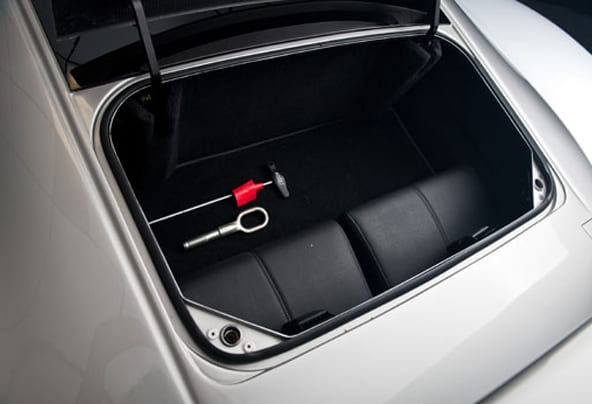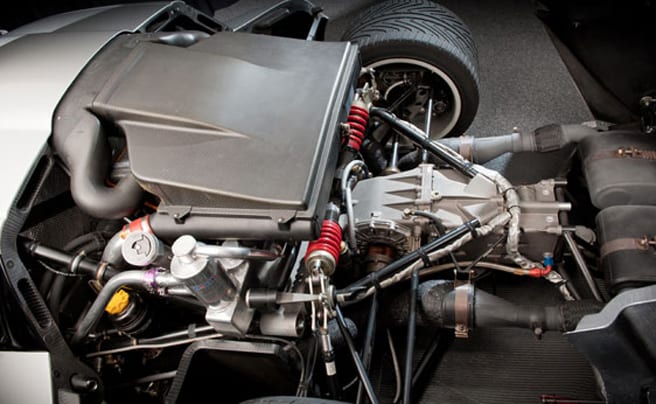Porsche 911 GT1 Evolution sold RM Auction 2016 €2.772.000
Overview
- 1997
Description
1997 Porsche 911 GT1 Evolution
- Chassis no. GT1 993-117
- Engine no. M86/60-109
- Gearbox no. G96/80/117
Sold for €2.772.000

Documents: UK V5
600+ bhp, 3,164 cc air- and water-cooled horizontally opposed six-cylinder engine with two KKK turbochargers and Bosch electronic fuel injection, five-speed manual transmission, front and rear independent suspension, and four-wheel ventilated disc brakes. Wheelbase: 2,500 mm
- Extensive competition history, including the Daytona 24 Hours
- Three-time Canadian GT Championship winner
- Recent comprehensive restoration in the United Kingdom
- The only road-legal 911 GT1 race car
- Two private owners from new
When international sports car racing experienced a resurgence in the 1990s, Porsche decided to jump back into the fray. Realizing its 911 GT2 Evos could not compete effectively in the BPR Global GT1 Championship, Porsche built a new mid-engined car on a composite and steel-tube chassis. The result was the 911 GT1, essentially a racing prototype that could be detuned, fitted with various comforts, and driven on the street. Although it met the FIA’s homologation rules, it infuriated its competitors, who had started with road machines that were extensively modified for racing. They were now faced with a ground-up purpose-built sports racing car.
The new Porsche prototype incorporated much of the Type 993’s front end, but with double-wishbone racing suspension. The rear of the car was all new, with double wishbones and push-rod shocks. The floorpan and bulkheads were of honeycomb aluminium and composite construction. Placed amidships under a sleek and very attractive carbon-fibre body was a flat-6 racing engine with water-cooled cylinders and heads, and its intake system was pressurized by a pair of large KKK turbochargers of the type used on the GT2. This quite sophisticated powerplant developed well over 600 horsepower.
The goal was to match the McLaren F1 GTR’s weight of less than 1,000 kilograms, but Porsche’s engineers concluded that a bit more weight would offer an unexpected advantage. By scaling 1,050 kilograms, the GT1 would be allowed a larger air intake and could thus generate considerably more horsepower. Having the engine behind the driver’s compartment rather than in the tail allowed Porsche’s engineers to maximize ground effects with a rear diffuser and once again usurped the FIA’s original intentions, as the GT1 had its engine amidships as opposed to in the rear as with all other 911-based racing cars.
According to Porsche’s Jürgen Barth, the factory produced six racing chassis, which were numbered 001–006, and 22 chassis that could be driven on the street. Eight additional customer racing chassis were delivered (numbered 396001–396023), and then for 1998, one more Straßenversion (Street Version) was completed, along with four additional racing cars. Thus, a total of just 41 GT1s were produced (18 racing cars and 23 streetcars), making the GT1 amongst the very rarest of all Porsche racing cars. Indeed, it is even rarer than its nemesis, the McLaren F1, of which some 107 examples of all varieties were produced.
A pair of factory entries captured both 1st and 2nd in class at the 1996 Le Mans 24 Hours and scored three wins in the 1996 BPR GT Series. Porsche upped the ante the following season with the 911 GT1-97 Evolution. The 1996 chassis and body received numerous modifications, but along with engine restrictions imposed by the FIA, Porsche now faced stronger competition. The GT1-97 Evos led at Le Mans before dropping out in the final hours; customer cars finished 5th and 8th. From 1996 to 2003, factory-entered and privateer 911 GT1s won an impressive 47 of 144 races entered. One of those privateer efforts was that of Bytzek Motorsports of Toronto, Ontario, Canada. Harry and Klaus Bytzek acquired three GT1-96 chassis and raced them extensively under Litens Industries sponsorship.
According to Barth, this GT1 chassis was sold as a bare tub through Porsche Motorsports North America to Bytzek Motorsports in 1997, replacing one of the 1996 chassis that was damaged at Mosport. The team was able to install the drivetrain and suspension components from its damaged car and purchased additional components through PCNA, including an Evo upgrade package. It is thus the only 1997 Evo sold new by the factory, all others being upgrades of 1996 chassis.
GT1 993-117 enjoyed an extensive competition history, with the Bytzek team scoring consistent high finishes, especially at its hometown track, Mosport, now known as Canadian Tire Motorsport Park, near Bowmanville, Ontario. The team handily captured the Canadian GT Championships in 1999, 2000, and 2001. At the 2001 Rolex 24 Hours of Daytona, the Bytzek team entered three GT1s (one a practice car). Chassis 117, driven by Klaus Bytzek, Scott Maxwell, David Empringham, and Richard Spenard, qualified 12th but dropped to 41st at the finish after having to replace the transaxle late in the gruelling contest. Its sister GT1 entry managed an impressive 8th place finish. Chassis 117 is believed to be the most successful of all Porsche 911 GT1 racing cars, with 13 wins in 31 starts.
The car was fully restored in 2014–2015 by Lanzante Motorsports in the United Kingdom at a cost in excess of £300,000 and has been run for less than two hours since. It appeared at the 2015 Goodwood Festival of Speed in company with Porsche’s Le Mans-winning Type 919 Hybrid.
Fittingly, it was a GT1 that scored Porsche’s 16th outright Le Mans victory prior to the 919 winning in 2015, which introduced the world to the incredibly complex hybrid powerplant that is now required to be at the forefront of modern LMP1 sports racing. As such, the GT1 marks the end of an era as well as the last of Porsche’s Le Mans-winning race cars that can realistically be run by a privateer.
Never before offered for public sale, this exciting 911 GT1 Evolution is described as the only road-legal GT1 race car and is currently registered as such in the United Kingdom.
It is eligible for historic racing events such as the GT90s Series, the Daytona Classic, and the Goodwood Festival of Speed, as well as the race car class of any prestigious Concours d’Elegance.
| 911 GT1 – RACE RESULTS | ||
| DATE | EVENT | RESULT |
| 29 August 1999 | Mosport CASCAR | 1st |
| 05 September 1999 | Mosport CRDA | 1st |
| 19 September 1999 | Mosport BEMC | 1st |
| 03 October 1999 | Mosport CASC | 23rd |
| 30 April 2000 | Mosport BARC | 1st |
| 14 May 2000 | Mosport BEMC | 1st |
| 21 May 2000 | Mosport Trans-Am | 6th |
| 04 June 2000 | Shannonville CRDA | 1st |
| 25 June 2000 | Shannonville Trillium Trophy | 1st |
| 09 July 2000 | Shannonville Canaska Cup | DNS |
| 13 August 2000 | Mosport BARC GP | |
| 27 August 2000 | Mosport | DNS |
| 03 September 2000 | Mosport CRDA | 1st |
| 17 September 2000 | Mosport BEMC | 2nd |
| 01 October 2000 | Mosport CASC | 19th |
| 04 February 2001 | 24 Hours of Daytona | 41st |
| 29 April 2001 | Mosport BARC GP | 4th |
| 13 May 2001 | Mosport BEMC | 2nd |
| 20 May 2001 | Mosport Trans-Am | 1st |
| 03 June 2001 | Shannonville CRDA | 2nd |
| 24 June 2001 | Mosport CASCAR | 4th |
| 08 July 2001 | Shannonville Canaska Cup | 2nd |
| 22 July 2001 | Shannonville Trillium Trophy | 3rd |
| 12 August 2001 | Mosport BARC | 2nd |
| 19 August 2001 | Mosport ALMS | 13th |
| 02 September 2001 | Mosport CRDA | 1st |
| 16 September 2001 | Mosport BEMC | 1st |
| 30 September 2001 | Mosport CASC | 1st |
| 12 May 2002 | Mosport BEMC | 1st |
| 19 May 2002 | Mosport Trans-Am | DNS |
| 16 June 2002 | Mosport CASCAR | DNS |
| 01 May 2003 | Mosport | |
Price: 3000000
Year: 1997
HP: 700
KMH:
1997 Porsche 911 GT1 Evolution
- Chassis no. GT1 993-117
- Engine no. M86/60-109
- Gearbox no. G96/80/117
Sold for €2.772.000

Documents: UK V5
600+ bhp, 3,164 cc air- and water-cooled horizontally opposed six-cylinder engine with two KKK turbochargers and Bosch electronic fuel injection, five-speed manual transmission, front and rear independent suspension, and four-wheel ventilated disc brakes. Wheelbase: 2,500 mm
- Extensive competition history, including the Daytona 24 Hours
- Three-time Canadian GT Championship winner
- Recent comprehensive restoration in the United Kingdom
- The only road-legal 911 GT1 race car
- Two private owners from new
When international sports car racing experienced a resurgence in the 1990s, Porsche decided to jump back into the fray. Realizing its 911 GT2 Evos could not compete effectively in the BPR Global GT1 Championship, Porsche built a new mid-engined car on a composite and steel-tube chassis. The result was the 911 GT1, essentially a racing prototype that could be detuned, fitted with various comforts, and driven on the street. Although it met the FIA’s homologation rules, it infuriated its competitors, who had started with road machines that were extensively modified for racing. They were now faced with a ground-up purpose-built sports racing car.
The new Porsche prototype incorporated much of the Type 993’s front end, but with double-wishbone racing suspension. The rear of the car was all new, with double wishbones and push-rod shocks. The floorpan and bulkheads were of honeycomb aluminium and composite construction. Placed amidships under a sleek and very attractive carbon-fibre body was a flat-6 racing engine with water-cooled cylinders and heads, and its intake system was pressurized by a pair of large KKK turbochargers of the type used on the GT2. This quite sophisticated powerplant developed well over 600 horsepower.
The goal was to match the McLaren F1 GTR’s weight of less than 1,000 kilograms, but Porsche’s engineers concluded that a bit more weight would offer an unexpected advantage. By scaling 1,050 kilograms, the GT1 would be allowed a larger air intake and could thus generate considerably more horsepower. Having the engine behind the driver’s compartment rather than in the tail allowed Porsche’s engineers to maximize ground effects with a rear diffuser and once again usurped the FIA’s original intentions, as the GT1 had its engine amidships as opposed to in the rear as with all other 911-based racing cars.
According to Porsche’s Jürgen Barth, the factory produced six racing chassis, which were numbered 001–006, and 22 chassis that could be driven on the street. Eight additional customer racing chassis were delivered (numbered 396001–396023), and then for 1998, one more Straßenversion (Street Version) was completed, along with four additional racing cars. Thus, a total of just 41 GT1s were produced (18 racing cars and 23 streetcars), making the GT1 amongst the very rarest of all Porsche racing cars. Indeed, it is even rarer than its nemesis, the McLaren F1, of which some 107 examples of all varieties were produced.
A pair of factory entries captured both 1st and 2nd in class at the 1996 Le Mans 24 Hours and scored three wins in the 1996 BPR GT Series. Porsche upped the ante the following season with the 911 GT1-97 Evolution. The 1996 chassis and body received numerous modifications, but along with engine restrictions imposed by the FIA, Porsche now faced stronger competition. The GT1-97 Evos led at Le Mans before dropping out in the final hours; customer cars finished 5th and 8th. From 1996 to 2003, factory-entered and privateer 911 GT1s won an impressive 47 of 144 races entered. One of those privateer efforts was that of Bytzek Motorsports of Toronto, Ontario, Canada. Harry and Klaus Bytzek acquired three GT1-96 chassis and raced them extensively under Litens Industries sponsorship.
According to Barth, this GT1 chassis was sold as a bare tub through Porsche Motorsports North America to Bytzek Motorsports in 1997, replacing one of the 1996 chassis that was damaged at Mosport. The team was able to install the drivetrain and suspension components from its damaged car and purchased additional components through PCNA, including an Evo upgrade package. It is thus the only 1997 Evo sold new by the factory, all others being upgrades of 1996 chassis.
GT1 993-117 enjoyed an extensive competition history, with the Bytzek team scoring consistent high finishes, especially at its hometown track, Mosport, now known as Canadian Tire Motorsport Park, near Bowmanville, Ontario. The team handily captured the Canadian GT Championships in 1999, 2000, and 2001. At the 2001 Rolex 24 Hours of Daytona, the Bytzek team entered three GT1s (one a practice car). Chassis 117, driven by Klaus Bytzek, Scott Maxwell, David Empringham, and Richard Spenard, qualified 12th but dropped to 41st at the finish after having to replace the transaxle late in the gruelling contest. Its sister GT1 entry managed an impressive 8th place finish. Chassis 117 is believed to be the most successful of all Porsche 911 GT1 racing cars, with 13 wins in 31 starts.
The car was fully restored in 2014–2015 by Lanzante Motorsports in the United Kingdom at a cost in excess of £300,000 and has been run for less than two hours since. It appeared at the 2015 Goodwood Festival of Speed in company with Porsche’s Le Mans-winning Type 919 Hybrid.
Fittingly, it was a GT1 that scored Porsche’s 16th outright Le Mans victory prior to the 919 winning in 2015, which introduced the world to the incredibly complex hybrid powerplant that is now required to be at the forefront of modern LMP1 sports racing. As such, the GT1 marks the end of an era as well as the last of Porsche’s Le Mans-winning race cars that can realistically be run by a privateer.
Never before offered for public sale, this exciting 911 GT1 Evolution is described as the only road-legal GT1 race car and is currently registered as such in the United Kingdom.
It is eligible for historic racing events such as the GT90s Series, the Daytona Classic, and the Goodwood Festival of Speed, as well as the race car class of any prestigious Concours d’Elegance.
| 911 GT1 – RACE RESULTS | ||
| DATE | EVENT | RESULT |
| 29 August 1999 | Mosport CASCAR | 1st |
| 05 September 1999 | Mosport CRDA | 1st |
| 19 September 1999 | Mosport BEMC | 1st |
| 03 October 1999 | Mosport CASC | 23rd |
| 30 April 2000 | Mosport BARC | 1st |
| 14 May 2000 | Mosport BEMC | 1st |
| 21 May 2000 | Mosport Trans-Am | 6th |
| 04 June 2000 | Shannonville CRDA | 1st |
| 25 June 2000 | Shannonville Trillium Trophy | 1st |
| 09 July 2000 | Shannonville Canaska Cup | DNS |
| 13 August 2000 | Mosport BARC GP | |
| 27 August 2000 | Mosport | DNS |
| 03 September 2000 | Mosport CRDA | 1st |
| 17 September 2000 | Mosport BEMC | 2nd |
| 01 October 2000 | Mosport CASC | 19th |
| 04 February 2001 | 24 Hours of Daytona | 41st |
| 29 April 2001 | Mosport BARC GP | 4th |
| 13 May 2001 | Mosport BEMC | 2nd |
| 20 May 2001 | Mosport Trans-Am | 1st |
| 03 June 2001 | Shannonville CRDA | 2nd |
| 24 June 2001 | Mosport CASCAR | 4th |
| 08 July 2001 | Shannonville Canaska Cup | 2nd |
| 22 July 2001 | Shannonville Trillium Trophy | 3rd |
| 12 August 2001 | Mosport BARC | 2nd |
| 19 August 2001 | Mosport ALMS | 13th |
| 02 September 2001 | Mosport CRDA | 1st |
| 16 September 2001 | Mosport BEMC | 1st |
| 30 September 2001 | Mosport CASC | 1st |
| 12 May 2002 | Mosport BEMC | 1st |
| 19 May 2002 | Mosport Trans-Am | DNS |
| 16 June 2002 | Mosport CASCAR | DNS |
| 01 May 2003 | Mosport | |
Details
Updated on August 13, 2016 at 12:00 am- Price: €3,000,000
- Year Built: 1997

































